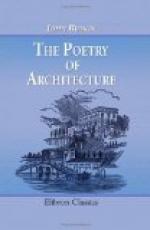119. And, for a yet more important reason, such appearance is not desirable. Melancholy, when it is productive of pleasure, is accompanied either by loveliness in the object exciting it, or by a feeling of pride in the mind experiencing it. Without one of these, it becomes absolute pain, which all men throw off as soon as they can, and suffer under as long as their minds are too weak for the effort. Now, when it is accompanied by loveliness in the object exciting it, it forms beauty; when by a feeling of pride, it constitutes the pleasure we experience in tragedy, when we have the pride of endurance, or in contemplating the ruin, or the monument, by which we are informed or reminded of the pride of the past. Hence, it appears that age is beautiful only when it is the decay of glory or of power, and memory only delightful when it reposes upon pride.[19] All remains therefore of what was merely devoted to pleasure; all evidence of lost enjoyment; all memorials of the recreation and rest of the departed; in a word, all desolation of delight is productive of mere pain, for there is no feeling of exultation connected with it. Thus, in any ancient habitation, we pass with reverence and pleasurable emotion through the ordered armory, where the lances lie, with none to wield; through the lofty hall, where the crested scutcheons glow with the honor of the dead: but we turn sickly away from the arbor which has no hand to tend it, and the boudoir which has no life to lighten it, and the smooth sward which has no light feet to dance on it. So it is in the villa: the more memory, the more sorrow; and, therefore, the less adaptation to its present purpose. But, though cheerful, it should be ethereal in its expression: “spiritual” is a good word, giving ideas of the very highest order of delight that can be obtained in the mere present.
[Footnote 19: Observe, we are not speaking of emotions felt on remembering what we ourselves have enjoyed, for then the imagination is productive of pleasure by replacing us in enjoyment, but of the feelings excited in the indifferent spectator, by the evident decay of power or desolation of enjoyment, of which the first ennobles, the other only harrows, the spirit.]
120. It seems, then, that for all these reasons an appearance of age is not desirable, far less necessary, in the villa; but its existing character must be in unison with its country; and it must appear to be inhabited by one brought up in that country, and imbued with its national feelings. In Italy, especially, though we can even here dispense with one component part of elevation of character,—age, we must have all the others: we must have high feeling, beauty of form, and depth of effect, or the thing will be a barbarism; the inhabitant must be an Italian, full of imagination and emotion: a villa inhabited by an Englishman, no matter how close its imitation of others, will always be preposterous.
We find, therefore, that white is not to be blamed in the villa for destroying its antiquity; neither is it reprehensible, as harmonizing ill with the surrounding landscape: on the contrary, it adds to its brilliancy, without taking away from its depth of tone. We shall consider it as an element of landscape, more particularly, when we come to speak of grouping.




